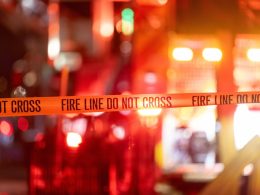Harvey Weinstein, the once-prolific film producer whose downfall on sweeping sex crimes allegations spurred the #MeToo movement against workplace sexual harassment, is set to face a retrial in Manhattan this week after New York’s Court of Appeals overturned his landmark first conviction.
Jury selection starts Tuesday in the case against Weinstein, 73, who is set to be retried on allegations of first-degree criminal sexual act and third-degree rape stemming from separate allegations by a former TV production assistant and aspiring actress concerning incidents in 2006 and 2013.
Manhattan District Attorney Alvin Bragg’s office has also hit him with a new charge of first-degree criminal sexual act relating to an alleged 2006 assault on a third woman involving forced oral sex at a hotel in Manhattan. He’s pleaded not guilty to all charges.
Prosecutors have estimated their case will take around four to six weeks.
New York’s highest court threw out Weinstein’s 2020 conviction and subsequent 23-year sentence in May 2024 after finding that the trial court judge, James Burke, erroneously allowed testimony about sexual assault incidents for which Weinstein was not charged. Burke is no longer on the bench following a reported behind-the-scenes lobbying campaign for his removal to Mayor Adams’s office led by Weinstein’s lead attorney, Arthur Aidala.
Regardless of the trial’s outcome, there is no chance of the jailed Miramax co-founder walking free. He was convicted at a second trial in Los Angeles on separate rape and sexual assault charges in December 2022 and sentenced to 16 years, which he’s set to continue serving after his New York matter resolves.
Weinstein is going back on trial in poor health, having undergone major heart surgery and received a leukemia diagnosis in recent months. Since being brought back to New York, he’s split his time between Rikers Island and Bellevue’s hospital ward.
The former moviemaker implored Manhattan Supreme Court Justice Curtis Farber, presiding over his retrial, to put the case before a jury imminently earlier this year so he could leave with his life from Rikers Island, calling it a “hellhole.”
WEINSTEIN
Aggie Kenny/AP In this courtroom sketch, Manhattan Supreme Court Judge James Burke, left, listens to testimony from witness Miriam Haley, right, while assistant Assistant District Attorney Megan Hast, standing, also listens in Harvey Weinstein’s sexual misconduct and rape trial, Jan. 27, 2020, in New York. (Aggie Kenny/AP)
Potential jurors will be screened for potential biases and their knowledge of the high-profile defendant.
Justice Farber has ruled that each side will have around 40 minutes to question them. Hundreds of prospective panelists were surveyed the first time around, which came after allegations against Weinstein first reported by The New Yorker and The New York Times broke the dam and led to an outpouring of similar allegations against men in positions of power, spanning entertainment, media, and multiple other industries.
Six women testified against Weinstein at the first trial, while dozens more had publicly levied allegations against him.
The jury convicted him of third-degree rape allegations levied by aspiring actress Jessica Mann and allegations he had forced oral sex and sexual assault on TV production assistant Mimi Haley, charges set to be tried again at the retrial.
The jury acquitted him on a count of criminal sexual act, alleged by Emmy-nominated actress Annabella Sciorra concerning an alleged rape in a Gramercy Park apartment in 1994. Actress Rosie Perez corroborated Sciorra’s allegations in gripping testimony at the trial.
Unlike at his first trial, the prosecutors handling Weinstein’s second Manhattan prosecution are from the DA’s Special Victims Division, which Bragg launched upon taking office. The unit has secured several high-profile sex crimes convictions since its creation.
Asked what he thought could play out differently at the second trial, Aidala told The News he hoped the #MeToo movement would now resonate with fewer members of the public.
“The biggest difference is the environment of the world. Me Too was front and center and, at that point, nobody had heard the term ‘coronavirus,’ migrants in the city wasn’t an issue, there was no war in Ukraine, there was no October 7,” Aidala said.
“People’s focus and priorities have changed exponentially,” he added. “We believe the ends of justice are that Harvey Weinstein had consensual relationships with all of the complainants and that he should be found not guilty of all charges.”

It’s unclear whether the disgraced Oscar-winning producer, who was behind box office hits like “Pulp Fiction” and “The Crying Game,” will take the stand, which he declined to do at his first trial. He meaningfully spoke in court once in 2020, just before his sentence was imposed, in a rambling statement addressing two of his accusers, Mann and Haley.
“I can’t stop looking at Jessica and Mimi and hoping something maybe from our old friendship with me could emerge,” Weinstein said. “I’m not going to say these aren’t great people. I had wonderful times with these people, you know. It just (that) I’m totally confused, and I think men are confused about all of these issues.”
He also noted in his statement to the court that he’d gone “to extraordinary lengths to hide my extramarital affairs” from his two wives, the latter of whom, Georgina Chapman, divorced him in the wake of the mountain of allegations.
If convicted at his second Manhattan trial, Weinstein could face an additional decades-long sentence.








